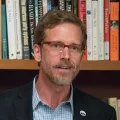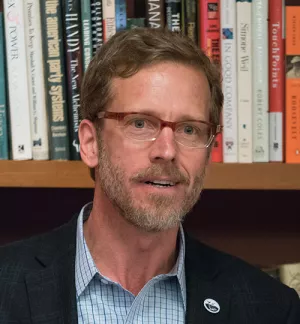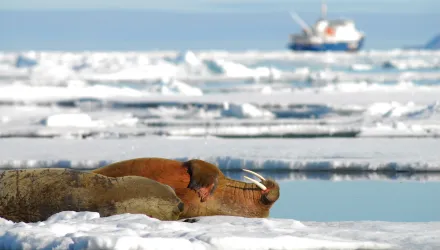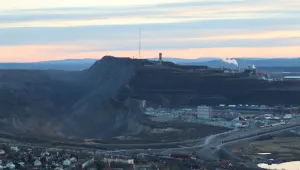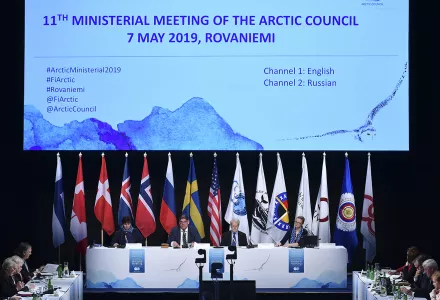
In addition to causing widespread suffering among Ukrainians and casting an ominous shadow over democracy in Europe, Russia’s brutal attack on Ukraine has disrupted decades of geopolitical norms and threatened energy and food security around the world. In the Arctic region, the Russian Federation’s outlaw behavior has slammed the brakes on the collaborative operations of the Arctic Council, the eight-nation intergovernmental forum that serves as the preeminent diplomatic and research body for the region.
On June 8, the “Arctic 7”—seven of the eight Arctic Council founding states including Canada, Finland, Iceland, Denmark, Norway, Sweden, and the United States—announced the suspension of their participation in regular business of the Arctic Council. They pledged to support any ongoing Council projects that did not involve Russia, but nonetheless confirmed what amounts to a near-total shutdown of an intergovernmental forum that has weathered several political disruptions in the past.
A consensus-based forum with a rotating two-year chairmanship, the Arctic Council has long been shielded from international disputes. The charter is focused on social and environmental issues and expressly limits any engagement on national or global security issues. Since the Council’s formation in 1996, this “Arctic exceptionalism” has ensured that hundreds of ongoing projects were not compromised by geopolitical issues. For better or for worse, Russia’s invasions of Crimea in 2014 and Georgia in 2008 did nothing to slow the work of the Council, and the body has been nominated for the Nobel Peace Prize on multiple occasions.
This time, however, the Arctic 7 have refused to abide Russia’s behavior, rendering the consensus-driven charter meaningless for now, and pressing the pause button for the Council. This has led think tanks, stakeholders, and scholars around the world to debate how and when the diplomatic and collaboration vacuum should be filled.
With all the focus on how to resuscitate the Arctic Council, however, few are asking whether it was the right model for international cooperation in the first place, particularly in the face of regional warming trends that are on average four times faster than those of the rest of the planet and accelerating. Thus far, the snail’s pace of international diplomacy has not met the urgency of addressing social and environmental problems in a transforming region, and a reliance on foreign ministries to lead rather than facilitate international collaboration may not suit the moment.
What means of governance could advance climate solutions at an effective pace while sidestepping the world-changing interplay of nation states? How could this be done for the whole Arctic while Russia, which represents 53% of the Arctic coastline, is a pariah state?
A solution to this governance crisis may already be seated at the table.
Look Within
In 1996, prior to and during the drafting of the Arctic Council charter, consistent pressure from Indigenous advocates in Canada to recognize the vital importance of Indigenous perspectives and concerns in the region led the drafters to establish the novel role of Permanent Participant (PP). That is, organizations that together represent the Indigenous peoples residing across the Arctic were each granted a seat at the Arctic Council table. These seats did not include a voting role because diplomatic norms were not up to the task, but this arrangement has proved farsighted, particularly against the current backdrop of full-throated calls for decolonizing institutions and practices in the region.
The Council’s Working Groups have since generated very well-regarded research and the eight states have signed some useful international agreements, but it is the direct role of the Indigenous organizations that has kept the work grounded in what is happening on the land and to Arctic inhabitants. In a time of geopolitical tension and rapid change, these Arctic Indigenous organizations have the most at stake and may be best positioned to ensure that important collaborative work continues.
As a thought experiment, consider a future in which these organizations step into the breach to form an interim Indigenous Arctic Council (IAC) to ensure projects keep pace with the rate of change in the region. The IAC could form its own secretariat to provide accountability, and then initiate projects to address immediate needs and augment the Arctic Council efforts now on hold.
Unlike the Arctic 7, this arrangement could claim pan-Arctic reach because three of the organizations—Aleut International Association, Inuit Circumpolar Council, and Saami Council—have members and representation in Russia. In addition, there would be nothing preventing the IAC from adding an additional organization that has deep relationships with the remaining Indigenous of Russia but is unconnected to the Russian Federation.1
Increasing Arctic Investments
The primary constraints for this novel arrangement are capacity and funding. In the best of times, the PP organizations struggled to keep up with the diplomatic demands of the Arctic Council schedule, and while the foreign ministries are not the primary funders of the projects themselves, they provide a convening capacity that will be hard to replace. There are, however, ways that an IAC-type arrangement could overcome funding shortfalls, and even attract substantial additional resources to a region in crisis.
First, the foreign ministries could redirect convening and travel resources to support the IAC. The sudden shutdown of travel-intensive Arctic Council work means the money is there—for now—and this may present an opportunity to maintain Arctic budget levels. Since this is not the Arctic Council, the ministries would not be limited by a charter that requires all eight states have a say, and could operate as convening facilitators for a new, Indigenous-led body without constraint.
Meanwhile the non-diplomatic agencies of cooperating states—for example, the National Oceanographic and Atmospheric Administration or the Environmental Protection Agency in the United States—could continue to support project-level work in collaboration with civil society, as before, but shift program management to the IAC rather than the foreign ministries.
Setting aside the constraints of the Arctic Council’s formal diplomatic channels on a temporary basis would also allow for deeper engagement with non-Arctic states as collaborative and funding partners. These entities are eager to facilitate science and resilience investments in the region and have chafed at diplomatic barriers to playing a larger role. This would allow resources from Singapore, Japan, and the European Union, for example, to flow into the region to address crucial priorities identified by the IAC.
To mitigate any threats that the national governments of the Arctic may perceive from enhanced international engagement in the region—some fear a dependence upon Chinese investments, for example—the Arctic 7 may each be given a non-voting seat on the IAC with the same consensus assurances that PPs received in the Arctic Council context. If a compelling case is made that certain funding arrangements compromise state security or strategic goals, constraints could be introduced for future collaborations.
If these partnerships are effective, funding levels for Arctic work could dramatically increase and allow the IAC to address the ongoing resource gap by requiring that all investments include support for Indigenous hiring, youth leadership training, and travel expenses. Ideally, this interim phase could be an opportunity to dramatically strengthen Indigenous institutions in the region and accelerate Native nation building—a priority for many Indigenous organizations and an urgent regional necessity as the Arctic undergoes rapid change.
Science and Indigenous Knowledge
Fallout from the Russian invasion has dramatically disrupted science diplomacy, as well as Arctic research itself, and institutions are adopting a wide range of policies regarding scientific integrity and interactions with Russian partners. For Arctic Council projects, the direct connection to foreign ministries is a primary barrier to resolving science diplomacy concerns. As long as a research program is connected directly to the Arctic Council and has Russian partners, it is on hold. This is having a major impact on research programs in a time of rapid regional change.
The primary provider of Arctic science within the Arctic Council, the Arctic Monitoring and Assessment Working Group (AMAP), predated the Arctic Council. It is worth exploring whether AMAP could be allowed to stand on its own again, temporarily shaking off the direct connection with foreign ministries and re-engaging with pan-Arctic research partners to ensure that geopolitics do not stifle critical research at a crucial time. It is rarely a mistake to de-politicize science, and this arrangement could help to do just that.
In this case, there is no reason the IAC could not partner with AMAP to help manage or enhance this ongoing work, especially as doing so could present opportunities to more effectively decolonize Western science practices in the region, coordinate with health, resilience, and social science projects that involve Indigenous partners, and elevate the role of Indigenous Knowledge.
The Transforming Arctic
Resilience in the transforming Arctic requires innovation. The concept of an Indigenous Arctic Council, whether temporary or more lasting, would disrupt some long-standing diplomatic norms in the region, but could have a net positive effect on Arctic resilience in the face of rapid change.
While diplomats are keen to ensure that the collaborative processes that led to Arctic Council projects are not destabilized by changing management structures, it is possible to do more than merely keep the lights on. As long as any new work is designed to be complementary to the paused Arctic Council projects, ongoing efforts through the IAC could address Arctic needs without undermining the intent or standing of the Arctic Council itself. More likely, the IAC’s efforts would be enhanced by, and in turn amplify, the long history of collaborative success established by the Arctic Council.
Regardless of how the Arctic states eventually address the diplomatic vacuum created by the shuttering of the Arctic Council, this disruption presents an opportunity to explore novel Indigenous-led structures tailored to the needs of a rapidly transforming region. In addition to providing an interim governance framework that could legitimately claim to address the entire Arctic, the IAC, or a similar structure, could elevate the standing of Indigenous voices and values, attract substantial new investments to Indigenous organizations, and allow for deeper and broader international engagement in Arctic affairs at a time of immense need.
Such an arrangement may or may not be of interest to Arctic Indigenous organizations, and aligning around a common structure would be a challenge, but in the face of rapid climate change, success in the Arctic hinges on the success of Indigenous institutions. For these reasons alone, the IAC is a concept worth exploring.
Clement, Joel. “The Arctic Won’t Wait: Novel Structures for Advancing Arctic Goals During Geopolitical Crisis.” Belfer Center for Science and International Affairs, Harvard Kennedy School, June 28, 2022
- The Arctic Council’s Permanent Participant organization based in Russia, the Russian Association of Indigenous Peoples of the North, is under the control of the Russian Federation and supports the invasion of Ukraine, and thus would be ill-suited to play a role in this new structure.

